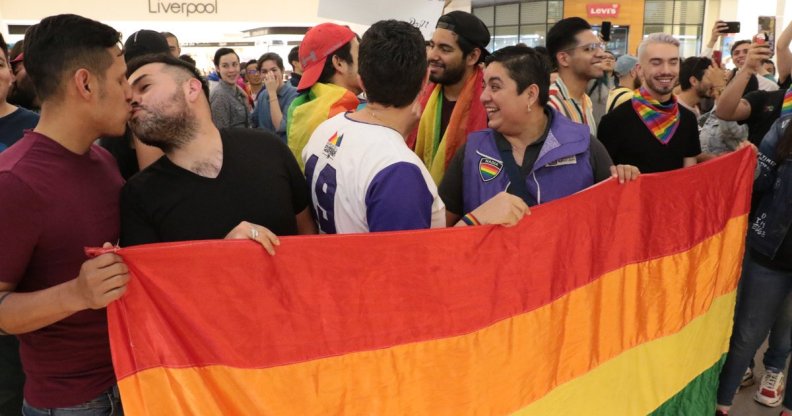Queer couples stage kiss-in protest in shopping mall after security banned two gay men from holding hands

Dozens of LGBT+ people staged a defiant kiss-in after plaza security guards forced a gay couple to stop kissing in Mexico. (Israel Salazar/Twitter)
Unfurling a sprawling LGBT+ Pride flag, protesters packed a shopping mall in Mexico on Sunday after security staff banned a gay couple from kissing and holding hands.
“Love is love!” the demonstrators chanted as they walked by luxury fashion stores and coffee house chains, kissing one another and waving flags as shoppers exchanged quizzical looks.
The Besotón vs Homofobia 2020 march was held in defiance after Galerías Monterrey, Monterrey, security officers demanded a gay couple stop kissing in the plaza.
Kiss-in staged after gay couple kicked out of shopping plaza.
Jorge and Iván were waiting in the square until a movie started in the cinema nearby when the patrolling guards cornered them and asked them to leave.
Officers asked if the couple “could not be groping” outside in case children see them, Jorge, one half of the couple, claimed in a viral Facebook video.
Regias del Drag, a drag queen collective in the northern city, organised the protest to openly defy the guards who, Jorde said, claimed they were “only following orders”.
At around 3pm, the shopping center of the plaza was paralyzed by the impassioned protesters, who rolled out rainbow banners and draped flags around them as capes. Some hoisted poles with unmissable trans-inclusive gender symbols on top.
Chants of “education is the option”, “no to discrimination” and “not a step back” echoed across the canyon of shops as protesters descended down the escalators.
https://twitter.com/BlogDelRegio/status/1234265822903906307
Hace unos días en un centro comercial de México, dos guardias de seguridad prohibieron besarse y darse la mano a una pareja gay. Y así es como protesto la gente el otro día 🇲🇽🌈 pic.twitter.com/GrThsU6sxc
— Igualdad LGBT 🏳️🌈 (@IgualdadLGBT) March 2, 2020
Hoy en el Día de Cero Discriminación, la comunidad LGBTTTIQ+ de Monterrey se hizo presente en plaza Galerías para un “besotón” y decir que no se va a dar marcha atrás en los derechos humanos, luego de que a principios de febrero guardias echaron a pareja de hombres por besarse.👏🏽 pic.twitter.com/Da2bMqlghj— Roberto Uriel (@roberto_uriel) March 1, 2020
¡Educar es la opción. No discriminación!
En Galerías Monterrey, protesta arcoiris de personas y colectivos #Lgbt🏳️🌈 se manifiestan en el centro comercial de Nuevo León 🇲🇽 como respuesta a discriminación que sufrió pareja gay hace unos días en esa plaza.
Video: @rubmaza pic.twitter.com/g47ogVPwjj— Escándala (@escandalamx) March 1, 2020
The group, which included Jorge and Iván alongside dozens of supporters and drag queens, later spilled into one of the major walkways of the shopping mall and kissed and embraced one another. A circle of supporters cheering each on.
Amor es amor
Besotón ante la discriminación que vivió pareja gay en Galerías Monterrey.
Nuevo León
Video: @rubmaza pic.twitter.com/JPtgBsfjXL— Escándala (@escandalamx) March 1, 2020
LGBT+ rights in Mexico.
Mexico City, a liberal island in the vastly conservative United Mexican States, first paved the way for marriage equality and a seismic shift towards acceptance in Latin America in 2009.

Mexico City Pride parade 2019. (Carlos Tischler/NurPhoto via Getty Images)
In breaking long-held taboos around homosexuality, the jurisdiction became the first to legalise same-sex marriage.
Years on, and each of the 31 states of Mexico have unique codes around marriage, forming a patchwork of states that have various degrees of marriage equality but, overall, it is not illegal.
Moreover, LGBT+ citizens enjoy study anti-discrimination laws and acceptance is on the up. Although, rights around parenthood and the military remain in limbo.
Some bills are still pending, clogging the Congress of Mexico, while others, such as banning conversion therapy, are proposed.
Furthermore, in 2019, Mexico was considered the world’s second-deadliest country for trans people.
A study by Mexican LGBT+ rights organisation Letra Ese has shown that, between 2013 and 2016, at least 473 LGBT+ people have been killed in the country, and 261 of these were trans women.
According to the report, the last two years have been the most violent, with a 30 per cent increase in the number of murders in relation to the average of previous years

